医药学专业英语
医学专业英语词汇
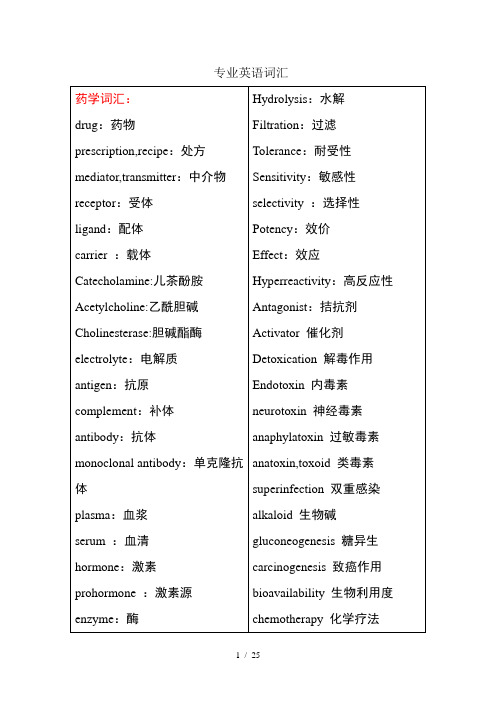
专业英语词汇第一节FDA和EDQM术语一、简写:FDA:Food and Drug Administration 食品药品管理局EDQM:EuropeanDirectorate for the Quality of Medicines 欧洲药品质量管理局ChP:Chinese Pharmacopoeia 中国药典USP:The United States Pharmacopoeia 美国药典NF:The National Formulary 国家处方集BP:British Pharmacopoeia 英国药典Ph.Eup:European Pharmacopoeia 欧洲药典Ph.Int:The International Pharmacopoeia 国际药典GLP:Good Laboratory Practice 药品实验研究规XGMP:Good Manufacture Practice 药品生产质量规X GSP:Good Supply Practice 药品经营质量规XGCP:Good Clinical Practice 药品临床试验规XINN:international nonproprietary name 国际非专业名称LD50:half lethal dose;median lethal dose 半数致死量LD100:absolute lethal dose 绝对致死量二、词汇:clinical trial:临床试验accelerated approval:加速批准animal trial:动物实验preparing and submitting:起草和申报standard drug:标准药物established name:确定的名称investigator:调查员drug product:药物产品submission:申报、递交generic name:非专有名称benefit<s>:受益drug substance:原料药物risk<s>:受害proprietary name:专有名称adverse effect:副作用adverse reaction:不良反应protocol:协议、草案archival copy:存档副本review copy:审查用副本identify:鉴别placebo:安慰剂agency:审理部门labeled amount:标示量strength:规格第二节医药学专业词汇一、医药学专业课程英文:Medicine:医学Internal Medicine:内科学Surgery:外科学Pediatrics:儿科学Gynecology:妇科学Diagnosis:诊断学Pathology:病理学Physiology:生理学Pathphysiology:病理生理学Anatomy:解剖学Human Anatomy and Physiology:人体生理解剖学Histology:组织学Embryology:胚胎学Histology and Embryology:组胚学Genetics Cell:遗传学BiologyMolecular Biology:分子生物学Immunology:免疫学Statistics Microbiology:卫生统计学Medical Genetics:医学遗传学Physics:物理学Medical Statistics:医学统计学Medical Immunology:医学免疫学Medical Cell Biology:医学细胞生物学Medical Microbiology:医学微生物学Medical Molecular Biology:医学分子生物学Mathematics:数学Higher Mathematics:高等数学Advanced Mathematics:高数Biochemistry:生物化学Medical Physics:医用物理学Medical Advanced Mathematics:医用高等数学Parasitology:寄生虫学Essential Chemistry:基础化学Medical Psychology:心理学Epidemiology:流行病学Image:影像学Diagnosis:诊断学Psychiatry:精神病学Neurology:神经病学Infectionology:传染病学Ophthalmology:眼科学Dermatology:皮肤病学Dermatology and Venereology:皮肤性病学Anesthesia:麻醉学Otorhinolaryngology:耳鼻喉学Oral science:口腔学Endocrinology:内分泌学Preventive Medicine:预防医学Surgical Nursing:外科护士Radiology:放射学radiotoxicology:放射毒理学radiopharmaceutics:放射药理学Osteopathic Medicine:骨科医学Dental Sciences:牙科学Pharmacy:药剂学Pharmacology:药理学Medicinal Chemistry:药物化学Pharmaceutics:药剂Physical Chemistry:物理化学Natural Medicinal Chemistry:天然药物化学Pharmacognosy:生药学toxicology:毒理学Pharmaceutical analysis:药物分析Pharmacy Administration:药事管理学Organic Chemistry:有机化学Inorganic Chemistry:无机化学Traditional Mongolia Medicine:蒙药学Traditional Chinese Medicine:中药学Chinese Herb Medicine :中草学Molecular pharmacology:分子药理学industrial pharmacy:工业药剂学Quantum pharmacology:量子药学Clinical pharmacology:临床药理学Chlinical pharmacy:临床药学Chronopharmacology:时辰药理学Pharmacogenetics:药学遗传学Pharmacodynamics:药动学pharmacokinetics:药代学二、医学词汇:人体器官英语词汇:head 头throat 喉chest 胸部abdomen 腹部thigh 大腿neck 颈部shoulder 肩部back 背部waist 腰部hip臀部wisdom tooth 智牙skull 头颅collarbone 锁骨rib 肋骨backbone 脊柱shoulder joint 肩关节shoulder blade 肩峰breastbone 胸骨elbow joint 肘关节kneecap 膝盖骨bone 骨骼skeleton 骨骼muscle 肌肉joint 关节blood vessel 血管vein 静脉artery 动脉capillary 毛细血管nerve 神经spinal marrow 脊髓brain 大脑respiration 呼吸windpipe 气管lung 肺heart 心脏exhale 呼气inhale 吸气internal organs 内脏gullet 食道stomach 胃liver 肝脏gall bladder 胆囊pancreas 胰腺spleen 脾脏duodenum 十二指肠small intestine 小肠large intestine 大肠blind gut 盲肠vermiform 蠕虫appendix 阑尾rectum 直肠chew 咀嚼swallow 吞咽digest 消化absord 吸收discharge 排放excrement 粪便kidney 肾脏bladder 膀胱intelligence 智力各种常见疾病的表达:Headache 头痛cold 感冒hepatitis 肝炎Pneumonia 肺炎cough 咳嗽trachitis 气管炎brain fever/meningitis脑膜炎cystitis 膀胱炎gastritis 胃炎acute gastritis 急性胃炎mastitis 乳腺炎bronchitis 支气管炎appendicitis 阑尾炎gastroenteritis 肠胃炎tumor 肿瘤bird flu/avian influenza 禽流感cancer 癌症leukemia 白血病SARS<Severe Acute Respiratary Syndrome> 非典型肺炎AIDS<Acquired Immune Deficiency Syndrome,AIDS> 艾滋病black death 黑死病mad cow disease 疯牛病influenza 流感cataract 白内障rabies 狂犬病stroke 休克coronary heart disease 冠心病diabetes 糖尿病lung cancer 肺癌liver cancer 肝癌pulmonary tuberculosis 肺结核hepatocirrhosis 肝硬化chronic 慢性的cancer of stomach 胃癌stomach trouble 胃炎heart disease 心脏病fever 发热amnesia 健忘症anemia, anaemia 贫血angina pectoris 心绞痛appendicitis 阑尾炎arthritis 关节炎bird flu, avian flu 禽流感bronchitis 支气管炎cancer 癌症cervicitis 子宫颈炎cold 感冒epilepsy 癫痫gout 痛风headache 头痛hemiplegy, hemiplegia 偏瘫icterus, jaundice 黄疸indigestion 消化不良influenza, flu 流感insanity 精神病insomnia 失眠症leukemia 白血病lupus 狼疮lupus erythematosus <LE> 红斑狼疮malnutrition 营养不良migraine, splitting headache 偏头痛neuralgia 神经病miocardial infarction 心肌梗塞neurasthenia 神经衰弱paralysis 麻痹peritonitis 腹膜炎pharyngitis 咽炎syncope 晕厥tetanus 破伤风tumour, tumor 肿瘤〔三〕化学元素名称的表达:Hydrogen 氢Helium he Carbon 碳Nitrogen 氮Oxygen 氧Sodium 钠Fluorine 佛Magnesium 镁Aluminum铝Phosphorus 磷Sulfur 硫Chlorine 氯Potassium 钾Calcium 钙Iron铁Copper 铜Zinc 锌Bromine溴Silver 银Iodine 碘Barium钡Gold 金Mercury 汞Lead 铅。
药学英语词汇
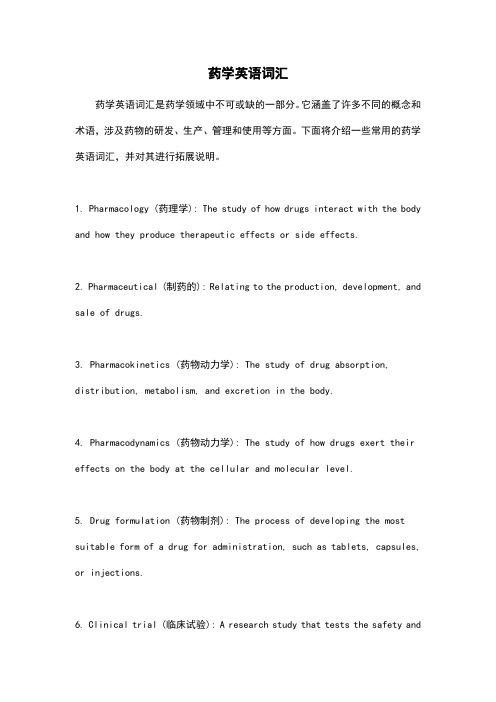
药学英语词汇药学英语词汇是药学领域中不可或缺的一部分。
它涵盖了许多不同的概念和术语,涉及药物的研发、生产、管理和使用等方面。
下面将介绍一些常用的药学英语词汇,并对其进行拓展说明。
1. Pharmacology (药理学): The study of how drugs interact with the body and how they produce therapeutic effects or side effects.2. Pharmaceutical (制药的): Relating to the production, development, and sale of drugs.3. Pharmacokinetics (药物动力学): The study of drug absorption, distribution, metabolism, and excretion in the body.4. Pharmacodynamics (药物动力学): The study of how drugs exert their effects on the body at the cellular and molecular level.5. Drug formulation (药物制剂): The process of developing the most suitable form of a drug for administration, such as tablets, capsules, or injections.6. Clinical trial (临床试验): A research study that tests the safety andeffectiveness of a new drug or treatment in humans.7. Drug interaction (药物相互作用): The effects that occur when two or more drugs are taken together, which can alter their individual therapeutic effects or cause adverse reactions.8. Adverse drug reaction (药物不良反应): Any harmful or unintended response to a drug, which may range from mild to severe.9. Pharmacist (药剂师): A healthcare professional who is knowledgeable about drugs, their uses, and their potential side effects, and who dispenses medications to patients.10. Prescription (处方): A written order from a healthcare provider fora specific medication, including dosage instructions and duration of treatment.11. Over-the-counter (OTC) (非处方药): Medications that can be purchased without a prescription, typically used to treat minor ailments and symptoms.12. Generic drug (仿制药): A medication that is equivalent to a brand-namedrug in terms of active ingredients, dosage form, strength, and route of administration, but is usually less expensive.13. Drug resistance (药物抗性): The ability of microorganisms or cancer cells to survive and multiply despite the presence of a drug, making the treatment less effective.14. Pharmacovigilance (药品监测): The science and activities related to the detection, assessment, understanding, and prevention of adverse effects or any other drug-related problems.15. Drug delivery system (药物输送系统): The technology or method by whicha drug is administered to the body, including oral, transdermal, inhalation, and intravenous routes.以上这些药学英语词汇不仅在医药领域中广泛使用,而且对于学习和理解药物的研发、使用和管理至关重要。
药学常用英语词汇

药学常用英语词汇英语的学习,词汇量的积累很重要,有关药学方面的词汇你了解多少呢,今天店铺在这里为大家分享一些药学常用英语词汇,欢迎大家阅读!药学常用英语词汇pharmacology 药理学pharmacodynamics 药效学pharmacokinetics 药动学drug action 药物作用etiological treatment 对因治疗symptomatic treatment 对症治疗adverse reaction 不良反应side effect 副作用toxic reaction 毒性反应allergy reaction 变态反应receptor 受体agonist 激动剂antagonist 拮抗剂partial agonist 部分激动剂efficacy 效能potency 效价强度first pass effect 首过效应hepato-enteral circulation 肝肠循环bioavailability 生物利用度half-life time 半衰期steady state plasma concentration 稳态血药浓度physical dependence 躯体依赖性psychic dependence 精神依赖性tolerance 耐受性resistance 耐药性药学专业常见英语词汇superinfection 二重感染apparent volume of distribution 表观分布容积pilocarpine 毛果芸香碱neostigmine 新斯的明atropine 阿托品scopolamine 东莨菪碱anisodamine 山莨菪碱adrenaline 肾上腺素dopamine 多巴胺ephedrine 麻黄碱noradrenaline 去甲肾上腺素metaraminol 间羟胺isoprenaline 异丙肾上腺素phentolamine 酚妥拉明propranolol 普萘洛尔procaine 普鲁卡因lidocaine 利多卡因tetracaine 丁卡因diazepam 地西泮phenobarbital 苯巴比妥phenytoin sodium 苯妥英钠chlorpromazine 氯丙嗪morphine 吗啡pethidine 哌替啶药学必背英语词汇aspirin 阿司匹林acetaminophen 扑热息痛ibuprofen 布洛芬caffeine 咖啡因nikethamide 尼可刹米lobeline 洛贝林quinidine 奎尼丁propafenone 普罗帕酮amiodarone 胺碘酮verapamil 维拉帕米digitoxin 洋地黄毒苷digoxin 地高辛nitroglycerin 硝酸甘油nifedipine 硝苯地平clonidine 可乐定reserpine 利血平prazosin 哌唑嗪captopril 巯甲丙脯酸furosemide 呋塞米hydrochlorothiazide 氢氯噻嗪antisterone 螺内酯mannitol 甘露醇chlorphenamine 氯苯那敏astemizole 阿司咪唑aminophylline 氨茶碱salbutamol 沙丁胺醇codeine 可待因cimetidine 西咪替丁heparin 肝素warfarin 华法令pituitrin 垂体后叶素oxytocin 缩宫素药学专业常用英语单词cortisone 可的松hydrocortisone 氢化可的松prednisone 泼尼松prednisolone 泼尼松龙dexamethasone 地塞米松thyroxine 甲状腺素thiamazole 甲巯咪唑insulin 胰岛素tolbutamide 甲苯磺丁脲gliclazide 格列齐特metformin 苯乙双胍penicillin 青霉素oxacillin 苯唑西林ampicillin 氨苄西林amoxicillin 阿莫西林piperacillin 哌拉西林cefalexin 头孢氨苄cefazolin 头孢唑林erythromycin 红霉素roxithromycin 罗红霉素amikacin 丁胺卡那霉素gentamycin 庆大霉素streptomycin 链霉素tetracycline 四环素oxytetracycline 土霉素minocycline 米诺环素chloramphenicol 氯霉素lincomycin 林可霉素clindamycin 克林霉素norfloxacin 诺氟沙星ciprofloxacin 环丙沙星ofloxacin 氧氟沙星isoniazid 异烟肼rifampicin 利福平chloroquine 氯喹primaquine 伯氨喹pyrimethamine 乙胺嘧啶。
(完整版)医学专业英语词汇
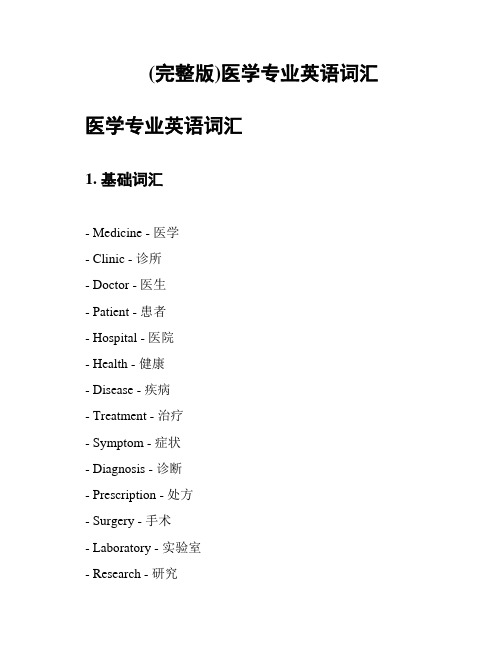
(完整版)医学专业英语词汇医学专业英语词汇1. 基础词汇- Medicine - 医学- Clinic - 诊所- Doctor - 医生- Patient - 患者- Hospital - 医院- Health - 健康- Disease - 疾病- Treatment - 治疗- Symptom - 症状- Diagnosis - 诊断- Prescription - 处方- Surgery - 手术- Laboratory - 实验室- Research - 研究- University - 大学- Medical - 医疗的- Nurse - 护士- Pharmacist - 药剂师- Therapist - 治疗师- Vaccine - 疫苗- X-ray - X光片- HIV - 人类免疫缺陷病毒- Cancer - 癌症- Diabetes - 糖尿病- Heart - 心脏- Kidney - 肾脏- Liver - 肝脏2. 解剖学词汇- Anatomy - 解剖学- Skeleton - 骨骼- Muscle - 肌肉- Nervous system - 神经系统- Digestive system - 消化系统- Respiratory system - 呼吸系统- Circulatory system - 循环系统- Skeletal system - 骨骼系统- Muscular system - 肌肉系统- Nervous tissue - 神经组织- Respiratory tract - 呼吸道- Circulatory system - 循环系统- Digestive tract - 消化道- Central nervous system - 中枢神经系统- Peripheral nervous system - 外周神经系统- Endocrine system - 内分泌系统- Urinary system - 泌尿系统3. 疾病词汇- Infection - 感染- Allergy - 过敏- Fever - 发烧- Inflammation - 炎症- Pain - 疼痛- Cough - 咳嗽- Headache - 头痛- Fatigue - 疲劳- Depression - 抑郁症- High blood pressure - 高血压- Arthritis - 关节炎- Asthma - 哮喘- Alzheimer's disease - 阿尔茨海默病- Stroke - 中风- Multiple sclerosis - 多发性硬化症- Pneumonia - 肺炎- Cancer - 癌症- Diabetes - 糖尿病- Heart disease - 心脏病- Kidney disease - 肾脏疾病- Liver disease - 肝脏疾病- Sexually transmitted disease - 性传播疾病4. 检查和测试词汇- Blood test - 血液检查- Urine test - 尿液检查- X-ray - X光检查- Ultrasound - 超声波- MRI (Magnetic Resonance Imaging) - 磁共振成像- ECG (Electrocardiogram) - 心电图- PET scan (Positron Emission Tomography) - 正电子发射断层扫描- Colonoscopy - 结肠镜检查- Pap smear - 涂片检查- Biopsy - 活检- Lymph node biopsy - 淋巴结活检- Bone marrow biopsy - 骨髓活检5. 药物相关词汇- Medication - 药物- Drug - 药品- Prescription - 处方药- Over-the-counter (OTC) - 非处方药- Antibiotics - 抗生素- Analgesics - 镇痛药- Antidepressants - 抗抑郁药- Antipyretics - 退热药- Antihistamines - 抗组织胺药- Anticoagulants - 抗凝药- Opioids - 麻醉药- Diuretics - 利尿药- Antivirals - 抗病毒药- Anti-inflammatory - 抗炎药- Beta blockers - 贝塔受体阻滞剂- Statins - 他汀类药物- Vaccines - 疫苗- Insulin - 胰岛素- Cholesterol-lowering drugs - 降低胆固醇药物以上是医学专业英语词汇的一部分,希望对您的学习和工作有所帮助。
制药专业英语词汇完整翻译版
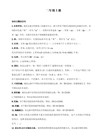
medicinal药品,药物, 药的,药用的,治疗的 medical 医学的,医术的pharmaceutical 药学的,制药的,药品 be split into 分成,分为alkaloid 生物碱 enzyme 酶polysaccharide 多糖,多聚糖 precursor 前体steroid 甾体 peptide 肽hormone 激素 gall 胆汁insulin 胰岛素 pancreas胰腺 serum/sera血清,浆液vaccine 疫苗 cholesterol 胆固醇gelatine 骨胶,明胶 antibiotic 抗生素,抗菌的interferon 干扰素 antibody 抗体fermentation 发酵 therapy 治疗/ therapeutic治疗的therapeutic margin caffeine咖啡因dopamine多巴胺 yeast 酵母mucous membrane粘液的,分泌粘液的 plasma 血浆,淋巴液,等离子体penicillin 青霉素 penicillium 青霉菌derivative衍生物 sterile无菌的,不能生育的aerobic 需氧的 oxygen氧,氧气feedstuff 饲料 lymph淋巴,淋巴液starch 淀粉 regiospecific reaction区域专一性反应stereospecific reaction立体专一性反应 glucose葡萄糖immobilize 固定 heterogeneous 不均匀的,多相的contamination污染 genetic 创始的,遗传学的hygienic 卫生学的,卫生的 intermediate中间体extraction 萃取 recrystallization 重结晶/ crystal 晶体,晶体的xylene 二甲苯 toluene 甲苯ether 醚 benzene苯/ chlorobenzene氯苯synthetic, 合成的,人造的;化学合成品 semisynthetic,半合成的synthesis [复syntheses] 综合,综合物,合成(法) synthesize vt 综合,合成 lead structure先导结构preparation 制备,制剂 isolate使分离,使离析 / isolation heart glycoside tocopherol 生育酚hydrolysis水解/hydrolysate水解产物/hydrolyze水解hydroxylation 羟基化 dextran 葡聚糖,代血浆wool 羊毛 ーlactamβ-内酰胺amino acid 氨基酸/ amino 氨基的 penicilamine 青霉胺ammonia 氨 ammonium 铵 / ammonium sulfate硫酸铵amine 胺 amide酰胺microorganism 微生物 micro b iological微生物学的mutant 变异的;突变型,突变体 starting material 起始原料natural source天然来源 organ器官/target organ 靶器官pancreas 胰腺 natural product 天然产物mould 霉,霉菌;发霉 high performance 高效bacterial 细菌的 protein 蛋白质degradation 降解 metabolism新陈代谢 / metabolize metabolite代谢物molecule n. 分子;微小颗粒/molecular weight分子量food additive 食品添加剂organic有机(体)的;有组织的,系统的;器官的;根本的lactic acid乳酸 citric acid 柠檬酸tetracycline 四环素 carbon dioxide 二氧化碳carbohydrate 碳水化合物 saccharide 糖/多糖polysaccharide nitrogen 氮 urea 尿素phosphate 磷酸盐 optimal 优化的,最佳的separate vt 分离 Food additiveabsorption 吸收 absorb vt. 吸收filtration 过滤 filtrate 滤液filte 过滤(vt),过滤器(n) recombinant 重组的,重组子purification 纯化 encode vt. 把(电文等)译成电码(或密码), 编码calcium 钙 chromatographic procedure 色谱操作步骤isomerization异构化 /isomeric phenol 酚fructose 果糖 fumaric acid 富马酸countless test 非计数的 diagnose诊断 diagnosticprotease 蛋白酶analysis分析/analyze 分析vt / analyst分析家/ analytical分析的Ingredient 成分 in combination with 结合Digestion 消化。
医药行业专业英语词汇_非常有用
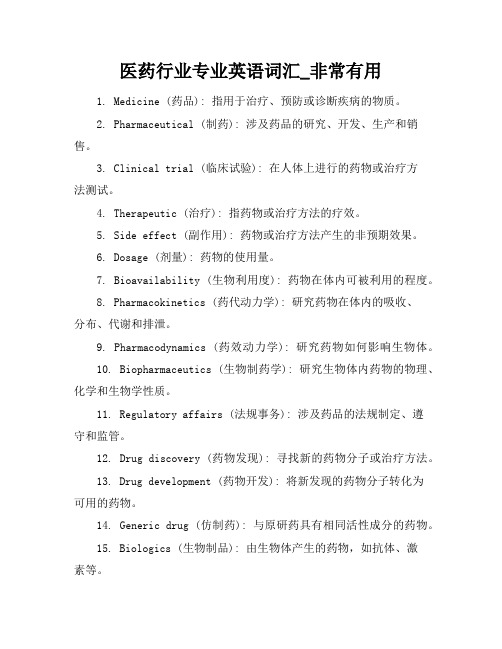
医药行业专业英语词汇_非常有用1. Medicine (药品): 指用于治疗、预防或诊断疾病的物质。
2. Pharmaceutical (制药): 涉及药品的研究、开发、生产和销售。
3. Clinical trial (临床试验): 在人体上进行的药物或治疗方法测试。
4. Therapeutic (治疗): 指药物或治疗方法的疗效。
5. Side effect (副作用): 药物或治疗方法产生的非预期效果。
6. Dosage (剂量): 药物的使用量。
7. Bioavailability (生物利用度): 药物在体内可被利用的程度。
8. Pharmacokinetics (药代动力学): 研究药物在体内的吸收、分布、代谢和排泄。
9. Pharmacodynamics (药效动力学): 研究药物如何影响生物体。
10. Biopharmaceutics (生物制药学): 研究生物体内药物的物理、化学和生物学性质。
11. Regulatory affairs (法规事务): 涉及药品的法规制定、遵守和监管。
12. Drug discovery (药物发现): 寻找新的药物分子或治疗方法。
13. Drug development (药物开发): 将新发现的药物分子转化为可用的药物。
14. Generic drug (仿制药): 与原研药具有相同活性成分的药物。
15. Biologics (生物制品): 由生物体产生的药物,如抗体、激素等。
16. Overthecounter (OTC) drug (非处方药): 不需要医生处方即可购买的药物。
17. Prescription drug (处方药): 需要医生处方才能购买的药物。
18. Drug interaction (药物相互作用): 两种或多种药物同时使用时产生的相互作用。
19. Adverse event (不良事件): 在药物使用过程中出现的非预期反应。
药学专业英语
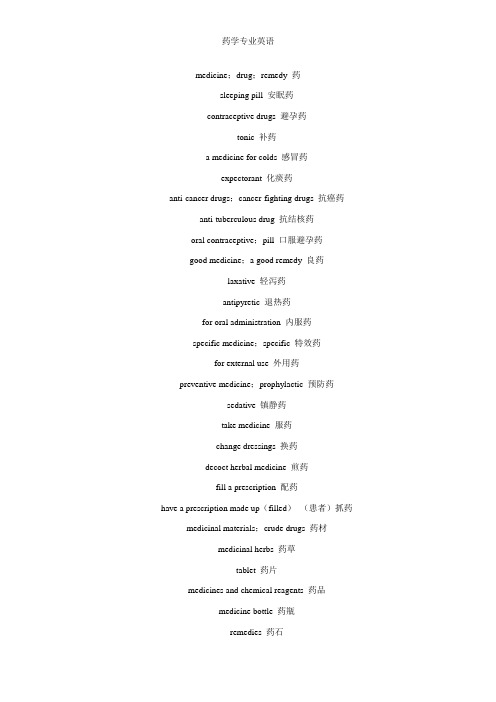
medicine;drug;remedy 药sleeping pill 安眠药contraceptive drugs 避孕药tonic 补药a medicine for colds 感冒药expectorant 化痰药anti-cancer drugs;cancer-fighting drugs 抗癌药anti-tuberculous drug 抗结核药oral contraceptive;pill 口服避孕药good medicine;a good remedy 良药laxative 轻泻药antipyretic 退热药for oral administration 内服药specific medicine;specific 特效药for external use 外用药preventive medicine;prophylactic 预防药sedative 镇静药take medicine 服药change dressings 换药decoct herbal medicine 煎药fill a prescription 配药have a prescription made up(filled)(患者)抓药medicinal materials;crude drugs 药材medicinal herbs 药草tablet 药片medicines and chemical reagents 药品medicine bottle 药瓶remedies 药石liquid medicine;medicinal liquid 药水lotion 洗液pill 药丸bolus 大药丸herbal medicines in a prescription 药味(中药方中的药)flavor of a drug 药味(药的味道或气味)medicines;pharmaceuticals;medicaments 药物heal with drugs 药物医治drug allergy 药物过敏materia medica 药物学drug poisoning 药物中毒(medicinal)powder 药粉ointment;salve 药膏apply a plaster 上药膏medical apparatus and instruments:医疗器械pharmaceutical factory:药厂drugstore;chemists shop;pharmacy:药店pharmacopeia:药典prescription:药方write out a prescription:开药方drugstore;chemists shop;pharmacy:医药商店hospital pharmacy;dispensary:医院或诊所里的药房expenses for medicine;charges for medicine:药费a pot for decocting herbal medicine:药罐子chronic invalid:药罐子(经常生病的人)apothecariesmeasure or weight:药衡medicinal herb collector;herbalist:药农herbal medicine shop:药铺asthma 哮喘pneumonia 肺炎heart disease 心脏病arrhythmia 心律不齐indigestion 消化不良gastritis 胃炎appendicitis 盲肠炎hepatitis 肝炎dermatitis 皮炎freckle/ephelis 痣,雀斑acne 粉刺flu 流感diarrhoea 痢疾quarantine 检疫vaccinate 打疫苗endemic 水土不服relapse 复发症casualty 急症stupor 昏迷sprain 扭伤scalding 烫伤graze 擦伤scratch 搔挠trauma 外伤bruise 淤伤fracture 骨折dislocation 脱臼tinnitus 耳鸣trachoma 沙眼colour blindness 色盲nearsightedness/myopia 近视astigmatism 散光gingivitis 牙龈炎cavity 龋齿fever 发烧discomfort/disorder 不适malnutrition 营养不良incubation 潜伏期asthenia 虚弱poisoning 中毒fatigue 疲劳heat stroke 中暑itching 发痒ache/pain 痛tetanus 破伤风night sweat 盗汗chill 打冷颤pale 脸色发白shuddering 发抖inflammation 炎症acute 急症chronic 慢性病congenital 先天性病nausea 恶心vomit 呕吐常用药品监管英语与缩略语——浙江省药品监督管理局政策法规处一、监管英语1.《中华人民共和国药品管理法》Drug Control Law of the People's Republic of China2.药品生产企业管理control over drug manufacturers3.药品经营企业管理control over drug distributors4.医疗机构的药剂管理control over medicines in medical institutions5.药品管理control over drugs6.药品包装的管理control over drug packaging7.药品价格和广告的管理control over drug price and advertisement8.药品监督inspection of drugs9.法律责任legal liabilities10.药品标识labels or marks of the drugs11.假药counterfeit drugs12.劣药inferior drugs13.药品检验机构drug quality control laboratory14.药品的生产企业drug manufacturers15.经营企业drug distributors16.医疗机构medical institutions17.药品监督管理部门drug regulatory agency18.药品批准证明文件drug approval documents19.行政处分administrative sanctions20.刑事责任criminal liabilities21.药品生产质量管理规范Good Manufacturing Practice for Pharmaceutical Products (GMP)22.药品经营质量管理规范Good Supply Practice for Pharmaceutical Products (GSP)23.药品生产许可证Drug Manufacturing Certificate24.药品经营许可证Drug Supply Certificate25.医疗机构制剂许可证Pharmaceutical Preparation Certificate for Medical Institution26.进口药品注册证书Import Drug License27.临床试验clinical trial28.新药证书New Drug Certificate29.药品批准文号Drug Approval Number30.在中华人民共和国境内从事药品的研制、生产、经营、使用和监督管理的单位或者个人,必须遵守《中华人民共和国药品管理法》All institutions or individuals engaged in research, production, distribution, use, and administration and supervision of drugs in the People's Republic of Ch ina shall abide by drug control law of the people's republic of China.31.国务院药品监督管理部门主管全国药品监督管理工作。
药学专业英语完整翻译

●symptomolytic 消除症状的●neurotransmitter神经递质●Oosperm 受精卵●prostaglandin 前列腺素●polyethylene 聚乙烯●octadecyl 十八(烷)基●osteoarthritis骨关节炎●dyspepsia 消化不良●pathophysiology 病理生理学●osteoporosis 骨质疏松症●hydrophilic 亲水的●urokinase尿激酶●trachoma沙眼●dysfunction功能紊乱●mucopolysaccharide 粘多糖(类) streptomycin 链霉素●pathophysiology 病理生理学●otorhinolaryngology耳鼻喉科学●phlebostenosis 静脉狭窄●nitroglycerin 硝酸甘油●pyrogen 热原,致热物●pseudocholinesterase拟(或假)胆碱酯酶●thioether 硫醚●somatotype体型●uricemia 尿酸血症●hysteroscopy子宫镜检查●chemoprophylaxis 化学预防●antipsychotic抗精神病的(药)●nephroangiosclerosis 肾血管硬化●bacteriostatic 抑菌的●parasympathomimetic拟副交感神经的(药)●adrenocorticotropin促肾上腺皮质激素●diuretic 利尿的(药)●vagosympathetic迷走交感神经的●alkaloid生物碱●teratogenesis 致畸作用●polioencephalitis 脑灰质炎●tetanotoxin 破伤风毒素●myotonia肌强直●hyperlipemia高脂血症●bronchiectasis支气管扩张●oxidoreductase氧化还原酶●oncology 肿瘤学●euthanasia 安乐死●Myocardial 心肌的●ophthalmoxerosis 干眼病●Vaginomycosis 阴道霉菌病●encephalorrhagia 脑出血●electrophilicity 亲电性●Mitochondria 线粒体●Stereochemistry 立体化学●Pancytopenia 全血细胞减少●streptokinase 链激酶●superinfection 二重感染,重复感染●osteomyelitis 骨髓炎●macromolecular 大分子的●Menopause 更年期; 绝经●Vasodilation 血管舒张●Thromboembolism 血栓栓塞●phytopharmacology 植物药理学●protoplasm 原生质●schizophrenia 精神分裂症●Hemiplegia 偏瘫,半身不遂●Fluorospectrophotometry荧光分光光度法●bradypnea 呼吸缓慢●Diarrhea 腹泻,痢疾●Pharmacodynamics药效学and pharmacokinetics药动学is the twomain areas of pharmacology药理学. The former studies the the effects of the drugs on biological systems, and the latter studies the effects of biological systems on the drugs. When describing the pharmacokinetics properties of a drug, pharmacologists药理学家are often interested in LADME:●Liberation●Absorption●Distribution●Metabolism●Excretion●药效学和药代动力学是药理学的两个主要领域。
- 1、下载文档前请自行甄别文档内容的完整性,平台不提供额外的编辑、内容补充、找答案等附加服务。
- 2、"仅部分预览"的文档,不可在线预览部分如存在完整性等问题,可反馈申请退款(可完整预览的文档不适用该条件!)。
- 3、如文档侵犯您的权益,请联系客服反馈,我们会尽快为您处理(人工客服工作时间:9:00-18:30)。
药学英语- 1 -Table of ContentsLesson 1 Pharmacy in China …………………………………………………Lesson 2 Vitamins ………………………………………………………………Lesson 3 Foods That Fight Cancer …………………………………………Lesson 4 Good Drugs Dangerous DosesA growing threat to public and personal health …………………………Lesson 5 Green Pharmacy Herbal Medicine …………………………………Lesson 6 Traditional Chinese Herbal Medicine …………………………….. Lesson 7 Natural Products ……………………………………………………- 2 -LESSON ONETEXTPharmacy in ChinaThe educational system was perhaps the first shock I encountered in China. The schools of pharmacy in the People’s Republic of China (PRC) are operated by two different governmental agencies. The State Pharmaceutical Administration, an agency of the central government, operates two pharmaceutical universities that have 4000 and 4500 students respectively. These two schools, in Shenyang in Northeast China and in Nanjing in East China, exist to prepare industrial pharmacists for positions within the pharmaceutical industry.In addition, another approximately 50 colleges of pharmacy throughout the various provinces of the PRC are operated by the Ministry of Public Health. There, colleges of pharmacy are almost equally divided between western medicine oriented schools1and those which teach future pharmacists the art and skills of Chinese herbal medicine. Most of the western medicine oriented schools are departments within large medical faculties where the traditional Chinese Medicine schools are sometimes found at medical faculties.SIMILAR TO THE U.S.The next surprise was that the curricula at the colleges of pharmacy in China were not so different from those encountered by pharmacy students in the U. S. In fact, the American student would probably be pleased to learn that the state board examination2prevalent here does not exist in China; rather, graduation and successful completion of studies enable one to become a fully qualified and registered pharmacy practitioner. Furthermore, recent graduates have more options in seeking employment than those who were usually assigned to an employment site based on existing needs of state-run pharmaceutical enterprises. The guided search for employment upon graduation is one of the major changes in China’s higher education, embraced by most college graduates.Virtually all of the graduates of the two pharmaceutical universities operated by the State Pharmaceutical Administration are employed within the- 3 -pharmaceutical industry.Graduates of the other schools of pharmacy generally find employment in hospitals and clinics.You are probably asking: “What about community pharmacy3?”Well, the answer is that people usually receive medical care in clinics at their place of employment, within various neighborhood health centers, or as outpatients at large hospitals. All of these sites employ pharmacists who dispense drugs. Therefore, it is not often that a patient needs to go to a community pharmacy shop to obtain medications.EAST AND WESTMost of the community pharmacies have two departments or two areas, and this is also the case in hospitals and clinics. On one side of the pharmacy we find something which very much resembles any pharmacy that we would see in the U. S. or in Western Europe; but on the other side of the room, or in the next room, is a strange sight - drawers and drawers of herbs and items such as dried portions of small animals, antlers, roots, and pieces of various other dried objects. These are compounded by specialists in traditional Chinese medicine; powders are made, for swallowing by patients.It is easy for us to laugh at this latter type of therapy, but it retains its faithful followers and is considered to be equal in importance to the western drugs and western medicine practiced in China.If one chooses to purchase a drug and does not feel the need to visit the physician at a clinic, one can go to the several community pharmacies which are located on the main shopping streets in downtown areas and ask for drugs. Virtually all drugs except narcotics and other scheduled substances4are legally available without a prescription. The patient may walk into the pharmacy and ask for ampicillin by name and be sold a small bottle containing 12, 16 or 24 capsules.Or he may ask the pharmacist to recommend an antibiotic for a child with an infection, sore throat, etc.While this is rather unusual in our American orientation, it was not a complete surprise to me, as I have seen Rx drugs5 being sold over-the-counter in many parts of the world. I admit, though, that I was curious about the potential for- 4 -abuse. I was assured by numerous individuals that the Chinese population had better things to spend their money on than taking needless drugs, and that there was a minimal if not almost non-existent chemical dependency problem6.SCOPE OF SPASomething ought to be said about the State Pharmaceutical Administration (SPA) which was mentioned earlier. It is a combination of the Food and Drug Administration, the entire pharmaceutical industry, research laboratories, pilot factories7 and educational institutions-all rolled into one.The Beijing-based SPA is a huge unit within the central government. SPA operates thousands of pharmaceutical factories and dictates production schedules8. It arranges contracts for raw materials and intermediate products9and also negotiates for the sale of finished dosage forms to the pharmacies and for export.Other divisions maintain quality control and quality assurance while yet other divisions oversee SPA’s two massive pharmaceutical universities as well as their on campus pilot plants used for training and for the production of drugs for clinical trials.The SPA also has a technology branch which conducts research into improving production techniques and evaluating new technology.During the three-week visit, I gave about a dozen lectures. At many of them, questions about American pharmacy practice were asked. Perhaps the most difficult concept for my Chinese colleagues to grasp was that of Americans deciding individually to move to another part of the country - to quit their jobs, return to school, accept employment elsewhere, or whatever the reason might be. When I mentioned anything of this nature, I was deluged with questions which basically asked what would hap pen if one’s supervisor refused to grant permission to leave one’s job. This says something about the employment situation in the PRC. My audiences were stunned when I indicated that one need only give some notice if there is not a formal contract, as a courtesy, and to select freely another place of employment.SPARTAN, BUT SIMILARDespite the rather spartan conditions found at most pharmacy operations in hospitals and clinics, the work was similar to what we do in that nearly all of the- 5 -products were prefabricated at the factory, including most of the traditional remedies. The pharmacists generally dispensed already manufactured capsules, tablets or powders. Powders were seen more frequently than they are here, but the bulk of the medication was, as it is here, in tablet dosage forms.Most of my Chinese colleagues were professionally well informed, reasonably happy with their jobs, and optimistic about the future.Nearly all of the persons I encountered were enthusiastic and positive about their profession and its future.There is a Chinese Pharmaceutical Association which has its headquarters in Beijing and branches in most other cities and provinces. These groups get together, discuss professional matters, and often publish journals and newsletters.The Association receives a subsidy or support from the national government.Interest was shown in social pharmacy, clinical pharmacy and pharmacy management, as these subjects are not presently taught at the colleges of pharmacy within the PRC. It was my impression, however, that pharmaceutics, biopharmaceutics, medicinal chemistry and pharmacology are similar to what is taught and known in this country.MONTHLY W AGE: $ 70In the 1980s, pharmacist earns about $ 70 per month, an amount that enables one to live reasonably comfortably. Rents are minimal; only a few dollars per month pays for a typical small apartment. Nearly all of the urban population resides in that type of housing.Transportation on buses costs only about a dime a ride, but most people appear to use bicycles as their principal means of conveyance. A sight I found interesting was a parking lot with bicycles arranged in neat rows for as far as the eye could see-similar to the huge automobile parking lots in the U. S. It costs about two pennies to park a bicycle for a day. Most of the other needs are relatively inexpensive, although the cost of food is increasing.The Chinese pharmacists I met appeared well dressed and there is an ever increasing variety of clothing styles, colors and designs. Health care is considered good and the status of the pharmacist is at least equal to that accords to pharmacists in this country.The possibility exists for greater interprofessional relationships. Reason: so - 6 -much of pharmacy is practiced in institutional settings where other health care practitioners function in close coordination with the pharmacist.A large number of the people I met in pharmacy circles had been to the U. S. at one time or another for postgraduate studies, short training classes or professional visits.I was convinced that the warm reception I received was due in part to the fond memories that many of these people had about their kind reception by American families and pharmacists while they visited the U. S.The trip was indeed fascinating and an eye opener.I recommend that my colleagues take such a voyage after they have passed a test in the use of chopsticks, as knives and forks are unavailable at many places.In reflecting about the visit after coming home, I once again came to the conclusion that we are very fortunate with the resources, appliances and status that we have as a profession in the U.S.WORDS AND EXPRESSIONSpharmacy [ ♐❍☜♦♓] n.药学;药店pharmaceutical[ ♐❍☜♦◆♦♓☜●] adj.制药(学)上的药学的;药用的pharmacist [ ♐❍☜♦✋♦♦] n.药剂师,药商;a ~’s药房oriented[ ❒♓♏⏹♦♓♎☜☺] adj. 导向的;以…目的的;重视…的herbal[ ♒☜♌☜●] adj.草的;草药的curriculum[ ☜❒♓◆●☜❍] n.学校的全部课程,(一门)课程prevalent [ ☐❒♏❖☜●☜⏹♦] adj.普遍的;流行的option [ ☐☞☜⏹] n.选择权enterprise [ ♏⏹♦☜☐❒♋♓]n.企业;公司embrace [♓❍♌❒♏♓♦] vi. 拥抱n.拥抱拥抱,接受outpatient [♋◆♦☐♏♓☞☜⏹♦] n. 门诊病人an ~ clinic 门诊所dispense [♎♓♦☐♏⏹♦] vt.分发, 分配;(尤指按处方)配(药)、发(药)medication[ ❍♏♎♓♏♓☞☜⏹] n.药物;药物治疗antler [ ✌⏹♦●☜] n.鹿角, 茸角鹿角therapy [ ♏❒☜☐♓] n.治疗,- 7 -疗法retain [❒♓♦♏♓⏹] vt.保持, 保留narcotic [⏹♦♓] n. 麻醉剂;催眠药prescription[☐❒♓♦❒♓☐☞☜⏹] n.药方,处方ampicillin [ ✌❍☐♓♦♓●♓⏹] n. 氨苄青霉素orientation[ ☎✆❒♓♏⏹♦♏♓☞☜⏹] n.定向位,方向位,熟悉,适应minimal [ ❍♓⏹♓❍☜●] adj.最低限度的,最小的dictate [♎♓♦♏♓♦] v.命令,支配intermediate[ ♓⏹♦☜❍♓♎☜♦] adj.中间的negotiate [⏹♓♈☜◆☞♓♏♓♦] v. 谈判;解决dosage [ ♎☜◆♦♓♎✞] n.剂量,用量assurance [☜☞◆☜❒☜⏹♦] n.保证;自信oversee [ ☜◆❖☜♦♓] v. 监督/视;检查massive [ ❍✌♦♓❖] adj.规模巨大的;大剂量的on-campus [ ✌❍☐☜♦] adj.校园内的clinical [ ●♓⏹♓☜●] adj.临床的deluge [ ♎♏●◆♎✞] v.淹没;泛滥supervisor[ ♦◆☐☜❖♋♓☜] n. 主管人stun [♦♦✈⏹] vt. 使大吃一惊;不知所措courtesy[ ☜♦♓♦♓ ] n.礼貌;好意Spartan [ ♦☐♦☜⏹] adj.简朴的prefabricate[ ☐❒♓♐✌♌❒♓♏♓♦] v.预制;预先构想remedy [ ❒♏❍♓♎♓] n.治疗(法),药物capsule [ ✌☐♦◆●] n.胶囊tablet [ ♦✌♌●♓♦] n.药片powder [ ☐♋◆♎☜] n.药粉,粉剂bulk [♌✈●] n.大批(量);大部分newsletter[ ⏹✞●♏♦☜☎❒✆] n.业务通讯subsidy [ ♦✈♌♦♓♎♓] n. 津贴pharmaceutics[ ♐❍☜♦◆♦♓♦] n.制药学,药剂学biopharmaceutics[ ♌♋♓☜◆♐❍☜♦✞8♦♓♦] [复] n.生物制药学,生物药剂学pharmacology[ ♐❍☜●☜♎✞♓]n.药理学,药物学reside [❒♓♋♓♎] vi.居住dime [♎♋♓❍] n.一角;很少的钱conveyance [ ☜⏹❖♏♓☜⏹♦] n.交通工具accord [☜♎] vt.给予,使一致interprofessional[ ♓⏹♦♏☐❒☜ ♐♏☞☜⏹●] adj.专业之间的;职业之间的institutional[ ♓⏹♦♦♓♦◆☞☜⏹☜●] adj.公共机构的setting [ ♦♏♦♓☠] n. 环境coordination[ ☜◆♎♓⏹♏♓☞☜⏹] n.协作;配合postgraduate[ ☐☜◆♦♦♈❒✌♎◆♓♦☐☜◆♦♦♈❒✌♎✞◆♓♦] adj.研究生的fascinating [ ♐✌♦♓⏹♏♓♦♓☠] adj.迷人的;吸引人的chopsticks [ ♦☞☐♦♦♓♦] n.筷子NOTES1.western medicine oriented schools: schools with western medicine as themain course2.the state board examination: the examination organized by the state board ofpharmacy in each statemunity pharmacy: public drug store on the street4.scheduled substances: Drugs with severe side effects have been classified bythe U.S. Government as the scheduled drugs, hence controlled by law.5.Rx drugs: drugs which must be prescribed by the doctor6....that the Chinese population had better things to spend their money onthan taking needless drugs, and that there was a minimal if not almost non-existent chemical dependency problems: ... that the Chinese people would spend their money on other things rather than on unnecessary drugs, and that the number of the persons addicted to drugs was quite limited, if there did exist such things7.pilot factories: factories in which drugs are produced for clinical trials8.production schedules: contents of drugs to be produced99.intermediate products: half-finished drugsEXERCISESI. Questions:1.Why was the author puzzled about the educational system in China?2.What’s the same characteristic of about 50 colleges of pharmacy throughoutChina?3.What kind of job will students get when they graduate from thepharmaceutical universities? And what about the graduates of other colleges of pharmacy?4.What’s the function of the SPA?5.What questions were often asked at the lectures given by the author?6.Why did the author think that the Chinese pharmacists were well-informed?7.According to the author, the Chinese colleagues were friendly to him. Why?8.The author was much impressed by what he had seen in China. Find the proofin the text.9.What’s the author’s attitude towards traditional Chinese medicine?10.Can you tell, according to the text, something about pharmacy in the USA?II. Translation1.人首次与医生打交道也许是在他出生时。
